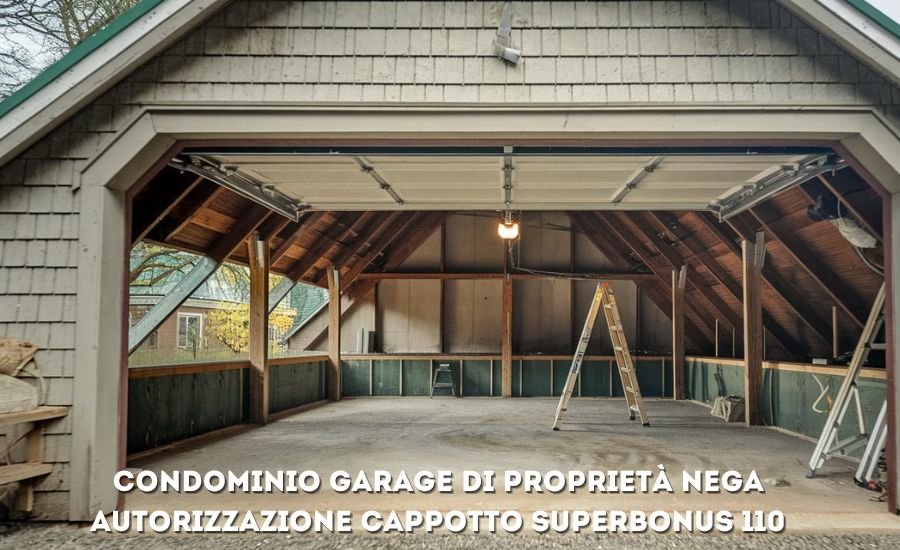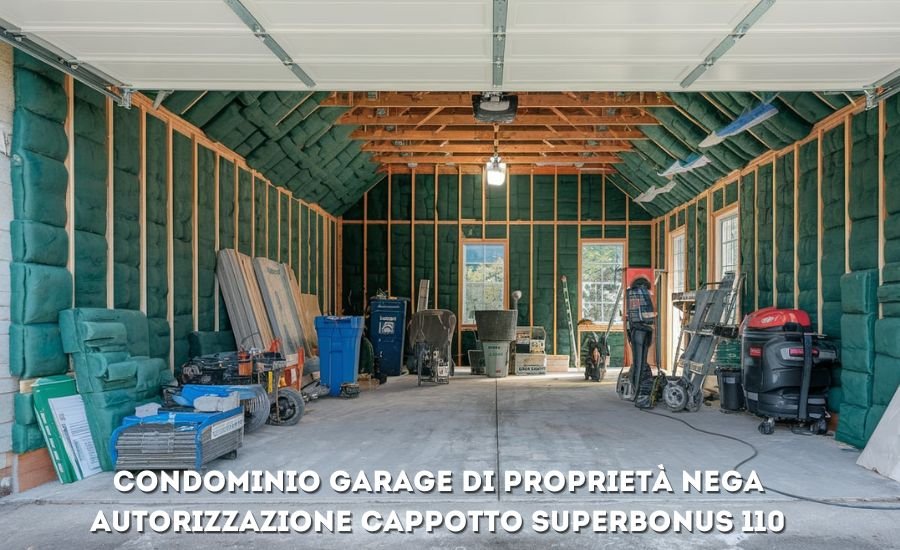The Superbonus 110% is one of the most transformative government incentives introduced in Italy, aimed at improving the energy efficiency of buildings. While this initiative has helped homeowners make substantial renovations with little to no cost, some aspects remain challenging—especially for those living in condominiums. A common issue arises when dealing with garages: the keyword “condominio garage di proprietà nega autorizzazione cappotto superbonus 110” reflects the frustration of homeowners trying to secure authorization for garage insulation projects but facing obstacles.
In this article, we’ll explore the complexities surrounding authorization for garage insulation in condominium settings under the Superbonus 110%. By addressing the legal, technical, and practical challenges, we’ll provide a step-by-step guide on how to navigate this difficult process and make the most out of Italy’s Superbonus program.
What is the Super bonus of 110%?
The Superbonus 110% is a groundbreaking initiative introduced by the Italian government to stimulate the economy, improve energy efficiency, and reduce the carbon footprint of buildings. Homeowners can claim a 110% tax deduction on costs incurred for energy efficiency upgrades, such as thermal insulation, solar panel installation, and heating system replacements. This tax incentive essentially makes it possible to renovate homes without any financial burden for the owners, as the government covers the cost through tax credits.
Key Energy Efficiency Improvements Covered by Superbonus 110%:
- Thermal Insulation (Cappotto Termico): Insulating the exterior walls of a building to improve its energy efficiency.
- Heating System Upgrades: Installing modern, energy-efficient heating systems.
- Solar Panels: Using renewable energy sources to power the building.
- Seismic Retrofitting: Strengthening the building’s resistance to earthquakes.
While the benefits of the Super bonus of 110% are clear, problems often arise when homeowners try to include garages, particularly those in condominium buildings, in their renovation plans.
Why Insulating Garages is Important for Energy Efficiency
One of the key upgrades under the Superbonus 110% is thermal insulation, often referred to as a “cappotto termico.” Insulating the external walls of a building can dramatically reduce energy consumption by minimizing heat loss in the winter and keeping the building cooler in the summer. However, when it comes to garages, especially those in condominiums, getting approval for such projects is far from straightforward.
Garages are often seen as non-living spaces, and some argue that insulating them doesn’t provide significant benefits to the overall energy performance of the building. However, this isn’t entirely true. If the garage shares walls with living spaces or is part of the main structure of the building, insulating it can contribute to the overall energy efficiency. This is why some homeowners pursue garage insulation under the Superbonus 110%, but they often face legal and bureaucratic roadblocks.
Legal Framework: Why Garages in Condominiums Face Authorization Issues
One of the most frequent challenges is encapsulated by the phrase “condominio garage di proprietà nega autorizzazione cappotto super bonus 110”—homeowners often find their requests to insulate garages denied by the condominium assembly. This happens for several reasons:
Garages as Non-Residential Spaces
Garages are often considered secondary, non-residential spaces, which makes them ineligible for certain energy efficiency projects under the Superbonus 110%. Many local authorities prioritize insulation for residential parts of the building, viewing garages as unnecessary to the overall energy-saving goals.
Shared Property Regulations
In a condominium setting, garages are often seen as shared or semi-private spaces. Any renovation affecting shared walls or common property needs to be approved by the condominium assembly, which means getting the consent of fellow condominium owners. If one or more owners object to the renovation, this can block the project entirely.
Minimal Impact on Energy Efficiency
Local authorities may only accept the authorization if they deem the energy-saving benefits of insulating a garage to be minimal. This is especially true for garages that are not directly connected to the living spaces or are detached from the main building.
Steps to Secure Authorization for Garage Insulation
If you’re looking to insulate your garage under the Superbonus 110%, here’s a detailed guide to help you navigate the complex authorization process:
Prepare Complete Documentation
You’ll need to submit thorough documentation to get approval for your project. Make sure you have:
- Proof of Ownership: Documentation showing that the garage is part of your property.
- Energy Performance Certificates: A report showing the potential energy savings from insulating the garage.
- Construction Permits: Any relevant permits required for structural changes.
- Condominium Assembly Approval: If the garage is considered part of the shared property, you’ll need the assembly’s approval.
Comply with Local Regulations
Every municipality in Italy has its building codes and energy-saving regulations. Research the specific rules for your area and ensure that your project aligns with them. This may include restrictions on the type of insulation you can use or the areas that can be insulated.
Consult with Qualified Professionals
It’s crucial to work with certified contractors and energy consultants familiar with the Superbonus 110% program. These experts can guide you through the technical and legal aspects of the renovation, ensuring that your application meets all the requirements.
Engage with the Condominium Assembly Early
If your garage is part of a shared condominium property, it’s essential to get the approval of the condominium assembly. Start discussing the project with your fellow condo owners early on, highlighting the benefits of garage insulation—such as increased property value and potential energy savings.
What to Do if Your Garage Insulation Request is Denied
If your request for garage insulation is denied under the Superbonus 110%, don’t lose hope. There are several actions you can take:
Appeal the Decision
You have the right to appeal a denial by providing additional documentation, correcting any errors, or submitting further evidence that supports the benefits of insulating your garage.
Consider Alternative Energy-Saving Measures
If insulation is not an option, you can still pursue other energy-saving projects for your garage that qualify under the Superbonus 110%. These include:
- Energy-Efficient Doors and Windows: Replacing old garage doors or windows with more energy-efficient options.
- Solar Panel Installation: Installing solar panels on the garage roof can contribute to overall energy savings.
- Internal Insulation: If external insulation is denied, you can insulate shared walls between the garage and the main living space.
Seek Legal Assistance
In some cases, legal action might be necessary, especially if the denial is based on procedural errors or unreasonable objections from other condominium owners. Consult a lawyer experienced in condominium and property law for guidance.
Alternative Energy-Efficiency Improvements for Garages

If garage insulation isn’t approved, there are other ways to improve your garage’s energy efficiency while still benefiting from the Superbonus 110%:
Upgrade Garage Doors
Replacing your garage door with a well-insulated, energy-efficient model can significantly reduce heat loss and improve the overall energy performance of your property.
Install Energy-Efficient Windows
Adding energy-efficient windows to your garage can improve natural light, reduce heat loss, and enhance the space’s overall insulation.
Add Solar Panels
Solar panels are one of the most popular energy-efficient upgrades. Even if garage insulation is denied, you may still be able to install solar panels on the roof of your home or garage, helping to offset energy costs.
Conclusion
The process of securing authorization for garage insulation under the Superbonus 110% can be challenging, especially in condominium settings where approval from other owners is required. However, by preparing your documentation carefully, complying with local regulations, and working with professionals, you can improve your chances of success.
If your request is denied, remember that alternative energy-saving measures, such as upgrading windows and doors or installing solar panels, can still provide significant benefits. Persistence, preparation, and collaboration with fellow condo owners are key to overcoming the hurdles presented by the Superbonus 110% program.
FAQs
Q: Can garage insulation be included in the Superbonus 110%? A: Yes, but it may require special authorization, especially if the garage is part of a condominium.
Q: What can I do if my garage insulation request is denied? A: You can appeal the decision, correct any documentation errors, or consider alternative energy-saving projects like solar panels or door/window upgrades.
Q: Do I need approval from the condominium assembly to insulate my garage? A: Yes, in most cases, especially if the garage is considered part of the shared property.
Q: Are there alternative energy-efficient upgrades for garages? A: Yes, alternatives include energy-efficient doors and windows, internal insulation, and solar panel installation.
This comprehensive guide should help you navigate the complexities of the condominio garage di proprietà nega autorizzazione cappotto superbonus 110 issue, ensuring that you can take full advantage of the Superbonus 110% program while enhancing your home’s energy efficiency.
Read Next: Wayne-Skawer-Comic-Strip

Specializing in insightful and engaging articles across a range of topics. With a keen eye for detail and a passion for delivering high-quality information, Mary helps readers stay informed with the latest trends and updates


